This all-new hybrid from Britain raises the bar for the hardware synth renaissance.
There’s no doubt that the resurgence of interest in hardware synths over the last few years has revitalised the market from top to bottom. You can’t have missed the countless new hardware releases from medium and large manufacturers over the last few years, but what you may not realise is the impact on smaller boutique ventures; the increased market for quality synth hardware has given the little guys a shot in the arm too. Most of the products we’ve seen from small-scale manufacturers are relatively humble – Eurorack modules, perhaps, or fairly affordable mini synths. The newly announced Modulus.002 from Bristol-based Modulus Music is a different matter entirely.
The Modulus.002 is the brainchild of Paul Maddox, a British synth designer previously responsible for the VacoLoco Zira synth and the GorF and Tron sequencers. The Modulus.002 is a huge step up from those previous designs. It’s a high-end 12-voice polyphonic synth will full multitimbrality, based around numerically controlled (digital) oscillators which lead into a fully analogue signal path, including custom-designed 24dB/octave transistor ladder filter.
The spec sheet reveals that the Modulus is a whole lot more than the average rehash of vintage synth features. There are genuine 21st-century innovations here, not least the inclusion of an Ethernet port to allow updates and patch sharing over the internet directly from the keyboard itself.
Whether you’re a potential customer or not – and, let’s face it, given the hefty asking price it’s not likely that many of us will be able to afford the Modulus.002 – it’s exciting to see the emergence of small companies designing and building innovative new synths. If this is the shape of things to come, we can’t wait to see what else Modulus have in store.
The Modulus.002 will go on sale at £2,995 ($5,200/€3,750), not including shipping or taxes. You can find more info and listen to sound clips on the Modulus Music website.
Check out more photos of the Modulus.002 and the full spec below (click the images to enlarge).
- modulus.002 provides twelve discrete voices of polyphony with full multi-timbrality if desired
- Two oscillators per voice with two sub oscillators, which can be switched from being either traditional square wave to having the same waveform as the main oscillator – in effect making four oscillators per voice
- Analogue / digital hybrid architecture uses NCOs for very high resolution, and very stable oscillators. Over 50 different waveforms, ranging from classic analogue sounds to more unique digital shapes
- modulus designed 24db per octave four pole transistor ladder filter, with some very unusual morphing characteristics or ‘polesweeping’, enabling transition from four pole through bandpass to one pole 6db per octave, or anywhere in between
- Two LFO’s, one per voice and one global
- Extensive modulation options, all accessed directly from the front panel – no menu options!
- modulus.002 features a range of sequencing options – a built in 12 Track, 12 row, 32 step sequencer with 16 dedicated step time editing knobs on the front panel and MIDI sync capabilities. Sequences can also be transposed dynamically while running
- A very highly featured arpeggiator with a wide range of different modes, including modulus ‘hold’ mode, enabling arpeggiator-based sequences to be created
- The modulus Animator, which enables any control parameter on the modulus.002 to be sequenced, enabling very complex filter transisitions, wave form changes and modulation matrix changes to be sequenced
- Superb UI, a great departure from the norm of synthesisers, featuring a veryhigh quality 4.3″ screen with wide viewing angle, display is context sensitive where the control parameters of any control knob that is touched by the user, is immediately displayed
- Twelve ‘quick recall banks’ are accessible directly from the front panel, enabling performing musicians to get rid of their set sheets and build set lists of presets, sequences and animations, all quickly accessible from dedicated front panel buttons. Up to ten banks of quick recalls can be created, making live performance a doddle
- VCF and VCA envelope generators
- Four Key Modes – Poyphonic, Monophonic, Unison and Stack
- Very high quality construction, uses a premium FATAR semi-weighted five octave key mechanism with aftertouch
- All voice control parameters are accessible from a well designed and intuitive front panel, that follows a traditional synthesiser work flow
- Pure analogue signal path with combined XLR/TRS sockets for balance / unbalanced outputs. Further, each of the twelve outputs can be brought out individually via a dedicated dsub socket
- Two audio inputs enabling audio processing from the VCF onwards plus external MIDI in and out
- XY joystick and Sustain and Expression pedal inputs for performance controls – any control parameter can be assigned to any joystick axis (X+, X-, Y+, Y-) by pressing the dedicated front panel selector button
- Ethernet port to connect your modulus.002 to your network and enable updates via the internet (no more midi sysex dumps) and access to theModulus cloud features
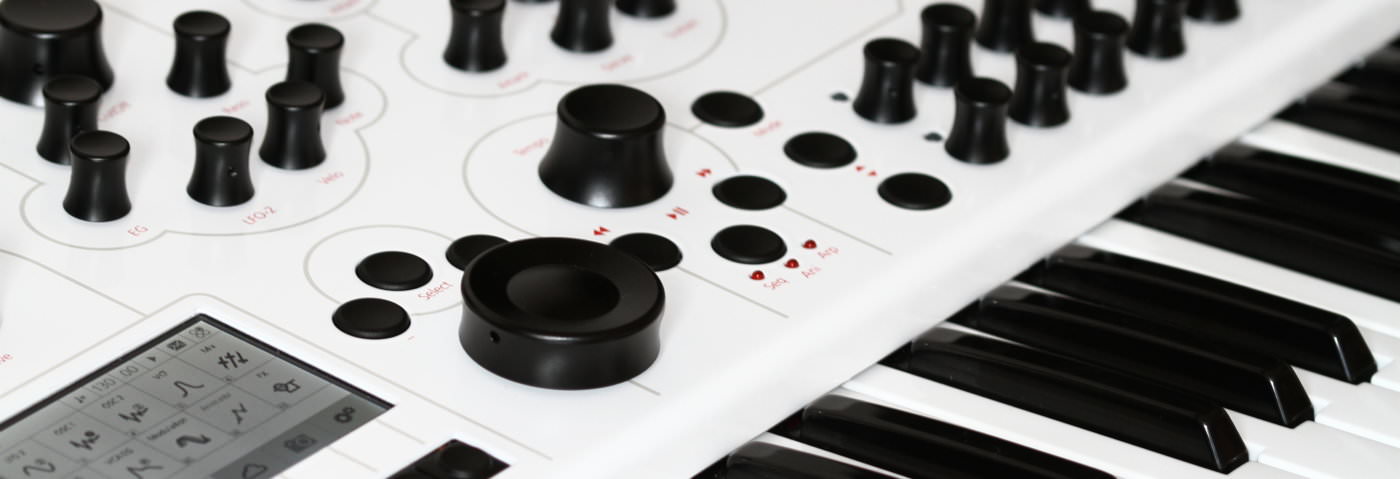
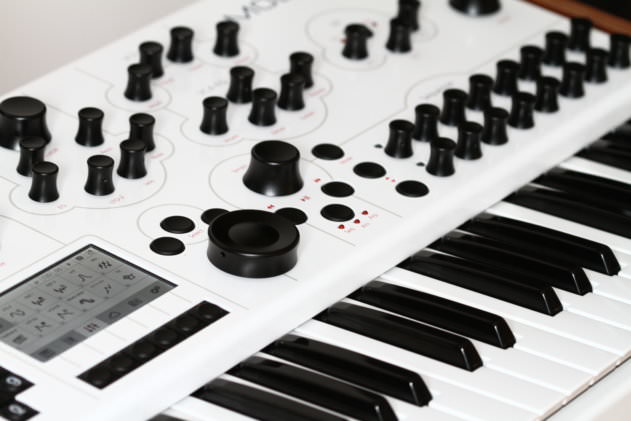
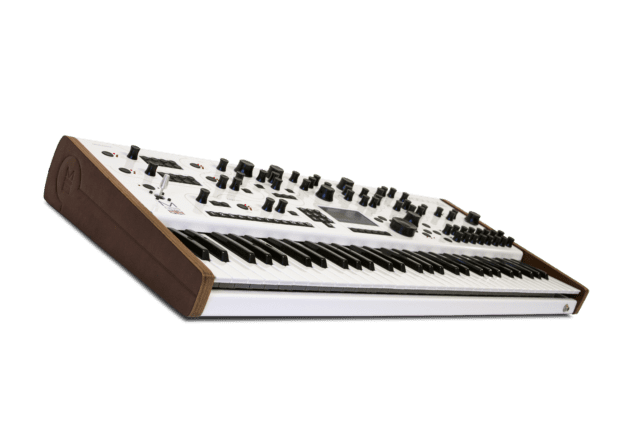
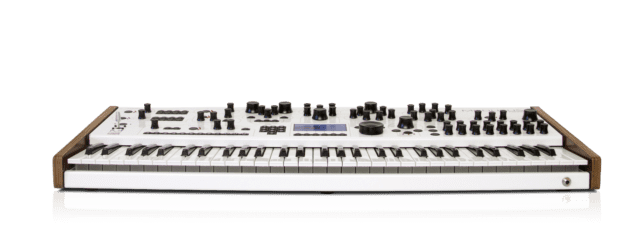
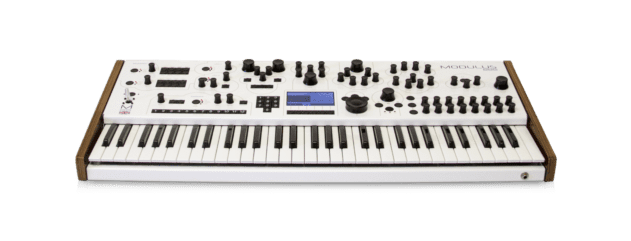
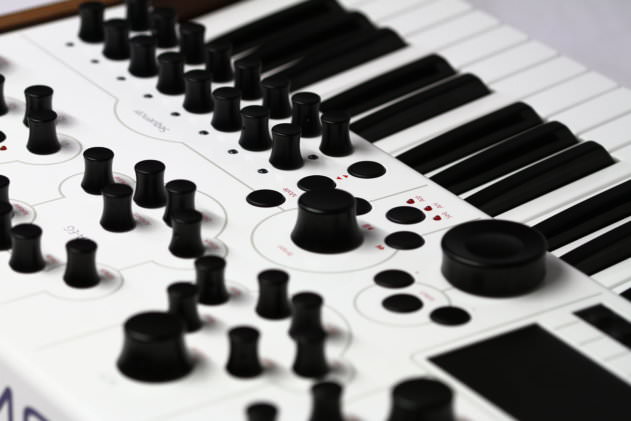

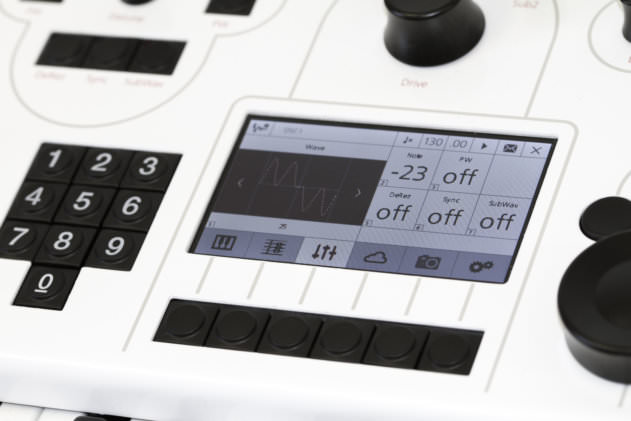
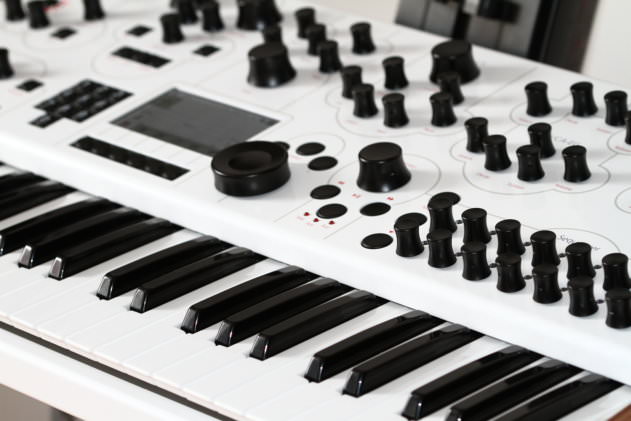
07.41 PM
Big respect to Paul Maddox & Co. for designing and releasing such an incredible instrument. I may never be able to afford one but, I applaud the effort and I can appreciate the quality and engineering that goes into a project like this. Well done sirs.
12.46 AM
Wow this synth looks perfect, it has EVERYTHING a synth aficionado could ask !!
Very nice product but definately not for everyone’s wallet ^^ As CF3 said, big respect for them for building such a dream synth
08.22 AM
Beautiful.
08.48 AM
WOW! Wonderful achievement and I wish Maddox & Co. the best. I wonder if a trimmed down rack version without the sequencer is on the cards. I’d always prefer to spend my money with a boutique manufacturer than one of the big boys. Not mad about the iWhite though. I would be dusting it constantly.
06.45 PM
Gorgeous synth.. but is anyone else underwhelmed by the six sound demos on the site?
08.14 PM
Yes… The CS80 demo on sound cloud is actually very nice. All of the others are not so good IMO. My Solaris sounds much better to me. Plus it has pitch/mod wheels. 🙂